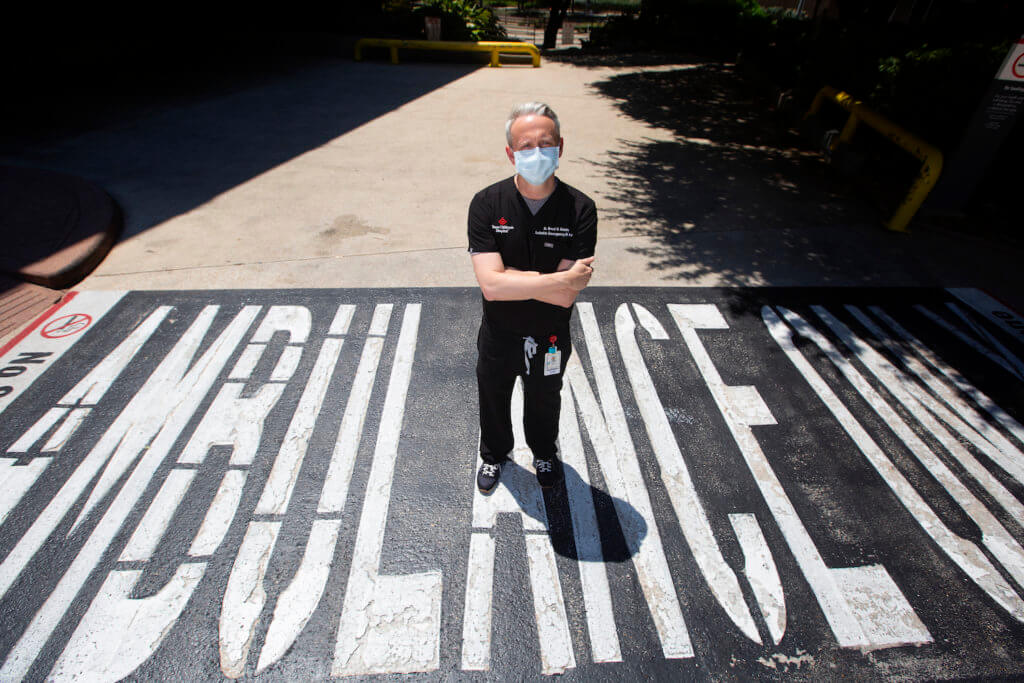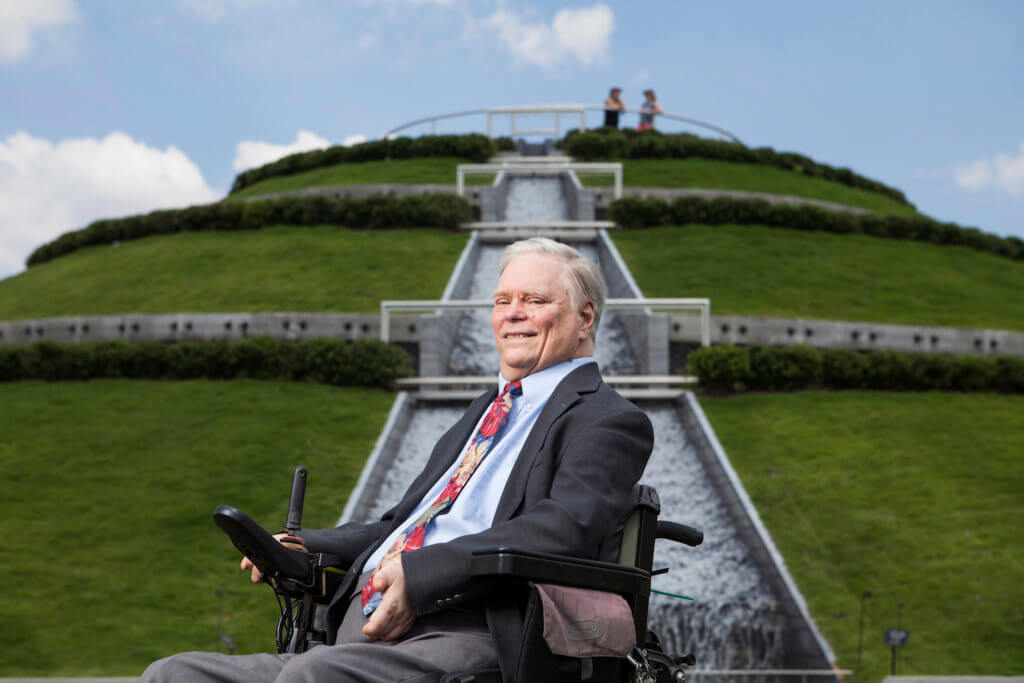Left Behind

Think of five children. They can be your own, your nieces or nephews, your grandkids, even the rowdy neighborhood brood who visit your front porch to trick-or-treat each year. Now close your eyes and picture one of them with a serious, debilitating mental health disorder—persistent depression or anxiety, recurrent yet unpredictable bipolar episodes, autism, alcoholism, or anorexia so severe his or her frail heart muscles eventually give out completely. It’s remarkably unlikely, isn’t it?
Open your eyes. According to the National Institute of Mental Health (NIMH), just over 20 percent, or one in five children, either currently or at some point in their lives suffer from a serious diagnosable mental health disorder. Some of these kids will require hospitalization, perhaps long-term treatment in acute-care facilities. Others will do well with weekly psychiatric counseling, medication, or other outpatient services. Still, there will be those who struggle despite numerous and varied combinations of therapy. No matter what form their treatment takes, some type of assistance is vital for these children to learn coping strategies, build resilience and manage their disorder as best they can.
To help care for the Houston population, institutions throughout the Texas Medical Center offer an extensive range of services for children and adolescents, including inpatient and outpatient facilities geared toward the diagnosis and treatment of bipolar disorder, anxiety, ADHD, autism spectrum disorders, mood disorders including depression, tics, Tourette syndrome, disorders associated with trauma, learning and developmental disabilities, anorexia and bulimia, substance abuse, suicide and others.
The problem is, it’s not enough.
Take for example the need for inpatient hospitalization. If a mother reaches out to her child’s physician in the case of a critical mental health emergency, he or she will tell her to call 911 or go to the nearest emergency room for care. Unfortunately, the majority of hospitals in the Texas Medical Center, and throughout Houston for that matter, do not offer pediatric inpatient psychiatric care—leaving physicians and parents with limited options during a crisis.
“I generally try hard not to admit a child to an inpatient facility unless absolutely necessary,” said Laurel Williams, D.O., director of residency training, Child & Adolescent Psychiatry at Baylor College of Medicine as well as director of the Baylor Child & Adolescent Psychiatry Clinic and associate professor of the Menninger Department of Psychiatry & Behavioral Sciences at Baylor. “If we can find another option, usually hospitalization is the last resort.”
It’s not because the inpatient facilities that exist in Houston are not excellent, or that treatment is not effective—it’s simply because resources are so scarce. Williams explained that the majority of hospitals in the TMC do not offer pediatric inpatient psychiatric care, so when a child presents at these emergency rooms in need of hospitalization because he or she is a potential harm to others or themselves, the child would need to be transferred to a different institution in order to be admitted to an appropriate treatment facility.
“There are only a few hospitals in the area that can provide inpatient care for children and adolescents, but sometimes beds are not available and they can be very expensive,” Williams explained. Even with good insurance, medications can be pricey and not all care is reimbursed.
The Menninger Clinic, ranked among the nation’s top five psychiatric hospitals, is an ideal inpatient option for adolescents ages 12 to 17 dealing with complex and co-occurring mental illnesses in need of a long-term treatment program. While they do have charity beds available for those who qualify, general treatment can be costly and their 16-bed unit usually has a wait ing list—all common obstacles parents face when seeking inpatient treatment at facilities throughout Houston.
“The thing is, when you talk to an adult about their mental health problems, regardless of what it is, and you ask them when their symptoms began, the vast majority will tell you that their symptoms started in childhood. It’s not like you turn 18 and suddenly you have mental health problems.” — LAUREL WILLIAMS, D.O., Director of the Baylor Child & Adolescent Psychiatry Clinic
Patients who do not have insurance or who cannot self-pay will be referred to The University of Texas Health Science Center at Houston (UTHealth) Harris County Psychiatric Center, but resources are extremely limited and they are often full as well.
“It makes me choke every time I think about it,” said Asim Shah, M.D., chief of Psychiatry at Ben Taub Hospital/Baylor College of Medicine, who also manages the clinical behavioral health programs for Harris Health System. “For the entire city of Houston, there are only 20 beds for children and adolescents who are uninsured, out of which only four are for children under the age of 12. I just can’t swallow that.”
It’s a problem Shah is forced to face often. Owned and operated by Harris Health System, Ben Taub proudly serves as a safety-net hospital for the city of Houston and Harris County, treating any individual in need of care regardless of insurance or immigration status. It is considered one of the best public health systems in the state and is staffed by physicians from The University of Texas Health Science Center at Houston (UTHealth) Medical School and Baylor College of Medicine, two of the nation’s top medical schools.
It is also the only hospital in Houston with a psychiatric emergency room open 24 hours a day, seven days a week. Still, it does not have pediatric inpatient psychiatric care built into its infrastructure. So what happens when an uninsured child comes through their emergency room in need of hospitalization and all 20 beds at Harris County Psychiatric Center are full?
“It occurs far too often,” Shah explained. “You see a patient on a Thursday or Friday and you want to admit them because they’re suicidal. I had a patient just recently who came in because she’d overdosed on two bottles of medicine and she needed to be admitted. She had no insurance so our transfer center called Harris County Psychiatric Center and they were full. So what do you do? Where do you keep them until a bed becomes available? Over the weekend, Harris County Psychiatric Center isn’t discharging patients usually, so she stays on a stretcher for observation for four or five days until a bed opens up. She is consulted by one of our psychiatrists during this time, but her treatment is delayed. Would you like that for your loved ones?”
Shah explained that it’s an issue the whole community needs to address. “We need to do something about it,” he said. “Even if you do have insurance, the number of beds is minimal.”
For children and adolescents who do not require immediate hospitalization, TMC member institutions offer a comprehensive range of outpatient services, but often the waiting lists are painfully long for parents who are anxious to find treatment and therapy options.
“Baylor, Texas Children’s and Harris Health all have a lot of outpatient clinics, which are great for kids who don’t need to be admitted to the hospital,” said Williams. “The only problem with these is the wait times—Texas Children’s Hospital can have up to a four-month waiting list to get in.”
DePelchin Children’s Center is one of the most recognized and respected institutions offering mental health services to children and adolescents in the Texas Medical Center. Having served the Houston community for over 120 years, DePelchin began as an orphanage and continues to focus on foster care and adoption in addition to providing mental health services including outpatient psychiatric services and counseling. They accept Medicaid, private commercial insurance and self-pay, and their multi-disciplinary specialty services, including their clinics in autism diagnostics and trauma-focused treatment, make the organization a sought-after option for Houston families—so much so that their waiting lists are notoriously long despite the multiple clinics they’ve established throughout the city.
It’s a problem prevalent in Houston.
A third-grade teacher who works in an underserved area of the city has been trying to help one of her students secure counseling for months. He has exhibited aggressive behavior, partially due to problems at home, and she is worried about how far he will go if he does not see a professional soon.
“The process has been extremely difficult and the waiting period is over two months just for an initial consult,” she said.
The TMC member institutions are doing what they can with the resources available, and over the past five years hospitals have increased their focus on extending outpatient services to reach more patients in the community.
Texas Children’s Hospital, in partnership with Baylor College of Medicine and the Menninger Clinic, now offers mental health services at some of their Community Cares Program practices, providing mental health services to underserved patients at no cost. The Community Cares Program, which was created by specific philanthropic commitments from the community and is now funded by Texas Children’s Hospital, works to provide medical services for children who would otherwise go to the emergency room for non-emergent needs or forgo treatment completely due to low family income or a lack of health insurance.
Memorial Hermann has opened Mental Health Crisis Clinics so if an adult or pediatric patient is suffering from an acute mental health concern but does not require hospitalization, he or she can be evaluated and treated by a psychiatrist without standing in the proverbial waiting list line.
“They are similar to the neighborhood minor emergency rooms you see all over the place, but they offer psychiatric services,” explained Carlos Guerra, M.D., medical director for psychiatric response case management at Memorial Hermann Health System. “Right now we have two clinics—one on the northeast side of Houston and the other in the Spring Branch area. It allows us to see patients quickly and start them on medications if need be, or help get them in with a psychiatrist in their area.”
Payment for these clinics is determined on a sliding scale, allowing Memorial Hermann to treat a wide range of patients regardless of insurance status.
“We also work to help patients acquire insurance if they qualify but for some reason don’t have it,” Guerra said. “Our goal is provide care and assistance while patients are waiting to get into outpatient treatment programs, so helping them secure funding is an important part of what we do.”
Guerra described the clinics as a godsend for the community. “I can’t tell you what a neat experience it has been to hear patients constantly saying thank you so much for being here, thank you so much for seeing us. I had one patient who had to tell me three times to make sure he drove his point in, he said, ‘No, sir, you don’t understand. You saved my life.’”
The clinics are partially funded by funds made available through Texas’ Medicaid 1115 Waiver program, which was approved in Dec. 2011 to expand reimbursements for uncompensated care costs and support a Delivery System Reform Incentive Payment (DSRIP) pool to incentivize hospitals and other providers to develop programs that would enhance access to health care.
Through the DSRIP system, health care organizations have created new, collaborative strategies for lowering the cost of care while improving access and quality. Ben Taub was able to increase its clinical behavioral health programs and outpatient services substantially, and DePelchin Children’s Center collaborated with the University of Texas to send therapists into schools and out into the community to help with prevention and treatment. It has been
a significant benefit to the mental health community, but leaders are worried about the fate of these programs if funding is not renewed when the waiver expires Sept. 2016.
“Right now, Ben Taub has the capability today to provide appointments within a few weeks or even days at our specialty clinics, our intensive outpatient program and our clinics throughout Houston,” explained Shah. “If DSRIP is not renewed, I don’t know what would happen to these outpatient appointments or these programs, because a lot would need to be cut. If you stop these services all of a sudden, patients will be coming to the emergency room again for outpatient care because it’s the only place they have to go.”
“One of the greatest opportunities that we have as mental health profes- sionals in the TMC is to create a stronger network or ‘think tank’ combining all of our thought leadership to develop actionable ideas that would result in more prevention and treatment options for pediatrics as well as adolescents here in Houston.” — ELIZABETH NEWLIN, M.D., Program and Medical Director of The Menninger Clinic and Assistant Professor at the Menninger Department of Psychiatry and Behavioral Sciences at Baylor College of Medicine
What the DSRIP funds have demonstrated is that it is possible to bridge the gap between the emergency room and the months-long waiting lists—as long as resources continue to become available. It’s a pervasive problem in the field with wide-ranging consequences. Not only could increased funding allow for additional inpatient beds and a broadening of outpatient appointments and programs, but it could also prompt further education in the discipline, which in turn would create more psychiatrists, more practices and more open appointments.
“There is a major shortage of psychiatrists and child psychiatrists,” said Guerra. “The residency programs are very small and I’m not sure why we are not pushing for this field the way we are for primary care. There is such a huge need for it, especially when you consider that a large percentage of the population at any one time is having some form of mental health issue.”
Guerra suggested that increasing mid-level providers like nurse practitioners and physician assistants would go a long way toward alleviating some of the need. Regrettably, Houston has closed its only psychiatric nurse practitioner program.
“The program would probably graduate about five to 10 nurse practitioners a year, and I guess they felt that it was not viable to keep the program running, but in our community they would be swooped up in two seconds,” said Guerra.
Williams voiced the same concern for the lack of providers in the field. “Texas Children’s really only has eight child and adolescent psychiatrists on staff, and there are over 1,000 pediatricians that can refer to us. There are just not enough of us.”
Williams added that insurance companies are loath to reimburse forms of psychotherapy, making the field less attractive than others. “As much as there is a problem for parents finding a good psychiatrist, there is equally a problem for finding a therapist that is trained in the specific form of therapy that can help your child.”
In spite of the shortage, TMC member institutions continue to emphasize the importance of helping the next generation of mental health clinicians, with many of them expanding their educational missions.
“We feel that one of our community responsibilities is not only to train our own staff, but also to provide an extensive array of training opportunities for others outside of DePelchin,” said Oscar Bukstein, M.D., M.P.H., medical director of DePelchin Children’s Center. DePelchin hosts professionals from the Baylor College of Medicine child psychiatry and psychology training programs.
Elizabeth Newlin, M.D., program and medical director of The Menninger Clinic and assistant professor at the Menninger Department of Psychiatry and Behavioral Sciences at Baylor College of Medicine, echoed these sentiments and said investing in the future workforce is one way Menninger is addressing both the quality of adoles- cent mental health care in Houston as well as the quantity.
“I feel like a contribution that Menninger makes is through training social work fellows, social work interns and child psychiatry fellows. On any given day we have a huge number of trainees here on our adolescent unit,” Newlin said. “We’ve expanded Menninger’s fellowship program within the past five years and I’m very proud of what we’ve done with our education and training of child psychiatrists. Many of our fellows are now out in the community doing really important work.”
The worth of which cannot be understated. While one in five children in the U.S. suffer from a serious mental health disorder at some point in their lives, nearly half—46 percent—will experience some form of mental health issue. In Harris County alone, it is estimated that nine percent of children and adolescents will have a severe functional impairment during a given year. Suicide is the second leading cause of death for 15 to 24 year olds in the U.S., killing more teenagers and young adults than cancer, heart disease, AIDS, birth defects, stroke, pneumonia, influenza and chronic lung disease combined.
And here’s another statistic: In 2012, Texas ranked 48th in the nation in state mental health expenditures per capita. Although the 2013 legislative session responded by securing record levels of funding, for an issue this prevalent, with consequences as devastating as any disease treated here in the medical center, there is still far too much to be done.
Continuing to invest in pediatric mental health will help ensure the children and adolescents in the Greater Houston area have access to the inpatient beds, outpatient appointments, treatment programs, and school and community-based interventions they need. Even more, it could generate a surge of early treatment and prevention programs throughout the city—something many clinicians believe could have the greatest benefit of all.
“The thing is, when you talk to an adult about their mental health problems, regardless of what it is, and you ask them when their symptoms began, the vast majority will tell you that their symptoms started in childhood. It’s not like you turn 18 and suddenly you have mental health problems,” said Williams. “One of the things that motivates me as a child psychiatrist is that I wanted to see if maybe we could change the outcome.”
That’s the shared goal—one that the institutions believe can be accomplished with the right resources and a culture of collaboration.
“One of the greatest opportunities that we have as mental health professionals in the TMC is to create a stronger network or ‘think tank’ combining all of our thought leadership to develop actionable ideas that would result in more prevention and treatment options for pediatrics as well as adolescents here in Houston,” Newlin said. “It will take time, but that to me is how we can graduate from an awareness level to a problem-solving level, and that’s how we can all reach even more young people throughout the Greater Houston Community.”
Shah reiterated that it is not a problem for one institution to shoulder.
“All involved parties need to come forward and work on a resolution, because we’re truly talking about our future generations here.”





